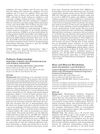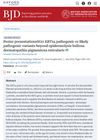 7 citations,
May 1978 in “International Journal of Dermatology”
7 citations,
May 1978 in “International Journal of Dermatology” Recent hair loss research shows some progress, especially in understanding male pattern baldness, but effective treatments for many types of hair loss are still lacking.
 5 citations,
May 2023 in “Frontiers in immunology”
5 citations,
May 2023 in “Frontiers in immunology” Environmental factors like diet and vitamin levels, especially Vitamin D, can affect autoimmune diseases differently, with lifestyle changes potentially improving outcomes.
 4 citations,
November 2020 in “Psoriasis : Targets and Therapy”
4 citations,
November 2020 in “Psoriasis : Targets and Therapy” The document concludes that proper treatment and management of plaque psoriasis in adolescents can improve their quality of life.
 4 citations,
October 2013 in “Springer eBooks”
4 citations,
October 2013 in “Springer eBooks” Melatonin receptors, found in many body parts, can help treat various diseases like depression and diabetes due to their effects on inflammation, tumor progression, sleep disorders, and body mass regulation.
 2 citations,
January 2014 in “Springer eBooks”
2 citations,
January 2014 in “Springer eBooks” The book details skin conditions in older adults, their link to mental health, cancer treatment importance, hair loss remedies, and managing autoimmune and itchy skin.

Afro-textured hair is more fragile and prone to certain scalp conditions, requiring careful treatment and more research for effective management.
 2 citations,
December 2007 in “Expert Review of Dermatology”
2 citations,
December 2007 in “Expert Review of Dermatology” The document concludes that early diagnosis and treatment are key for pediatric hair loss disorders, and addressing the emotional effects on children is important.
 2 citations,
January 2004 in “Elsevier eBooks”
2 citations,
January 2004 in “Elsevier eBooks” Lupus affects the skin in various ways, and proper skin examination is crucial for diagnosis and treatment.
 April 2020 in “Journal of the Endocrine Society”
April 2020 in “Journal of the Endocrine Society” A 14-year-old girl with no menstrual period was diagnosed with Swyer Syndrome and treated for a related cancer risk.
 September 2016 in “Springer eBooks”
September 2016 in “Springer eBooks” Looking older on the outside might be linked to aging faster on the inside and can be affected by lifestyle choices and health risks.
 November 2013 in “John Wiley & Sons, Ltd eBooks”
November 2013 in “John Wiley & Sons, Ltd eBooks” Skin symptoms can indicate endocrine disorders and have various treatments.
 June 2008 in “Springer eBooks”
June 2008 in “Springer eBooks” The document concludes that permanent hair loss conditions are complex, require early specific treatments, and "secondary permanent alopecias" might be a more accurate term than "secondary cicatricial alopecia."
95 citations,
January 2007 in “Human biology” Human hair can be classified into eight types based on physical features, not ethnicity.
 38 citations,
January 2019 in “International Journal of Women's Dermatology”
38 citations,
January 2019 in “International Journal of Women's Dermatology” The document concluded that more research is needed to find the best treatment for Frontal fibrosing alopecia.
7 citations,
November 2018 in “British Journal of Dermatology” Alopecia areata is caused by immune system issues, and JAK inhibitors might help treat it.
1 citations,
January 2018 in “Skin appendage disorders” The complement system might be involved in the development of alopecia areata and could lead to new treatments.
 January 2024 in “The Egyptian Journal of Hospital Medicine ”
January 2024 in “The Egyptian Journal of Hospital Medicine ” Hair loss may indicate a higher risk of heart disease and other health issues related to metabolism.
 July 2023 in “International journal of dermatology, venereology and leprosy sciences”
July 2023 in “International journal of dermatology, venereology and leprosy sciences” New treatments are being explored to slow or reverse hereditary hair loss.
May 2011 in “Harper's Textbook of Pediatric Dermatology” Alopecia areata causes patchy hair loss and has no cure, but treatments like corticosteroids and minoxidil can help.
April 2023 in “Medizinische Genetik” Male-pattern hair loss is largely influenced by genetics, with key genes identified.
 21 citations,
July 2022 in “Orphanet journal of rare diseases”
21 citations,
July 2022 in “Orphanet journal of rare diseases” New treatments for ichthyosis, like protein replacement and gene therapy, show promise and may become standard care.
7 citations,
August 2017 in “Genetic testing and molecular biomarkers” A new mutation in the FLCN gene linked to Birt-Hogg-Dube syndrome was found, suggesting people with certain lung collapse should be tested for this mutation and screened for kidney and colon cancer.
 4 citations,
December 2021 in “Experimental and Therapeutic Medicine”
4 citations,
December 2021 in “Experimental and Therapeutic Medicine” Adult female acne is complex and requires a combination of treatments for effective management.
 June 2024 in “British Journal of Dermatology”
June 2024 in “British Journal of Dermatology” KRT14 gene variants cause dermatopathia pigmentosa reticularis, affecting nails, teeth, and hair.
 April 2024 in “Nigerian Postgraduate Medical Journal”
April 2024 in “Nigerian Postgraduate Medical Journal” Androgenetic alopecia is a common hair loss condition influenced by various factors and linked to psychosocial and cardiovascular issues.
 May 2023 in “Advances in medicine”
May 2023 in “Advances in medicine” Alopecia areata significantly impacts patients' mental health and quality of life.
 December 2021 in “Acta Marisiensis”
December 2021 in “Acta Marisiensis” Insulin resistance increases the risk of developing type 2 diabetes and other health issues.
 104 citations,
May 2019 in “F1000Research”
104 citations,
May 2019 in “F1000Research” Losing weight, fixing varicoceles, and using advanced sperm selection methods improve male infertility treatment outcomes.
 80 citations,
April 2006 in “Clinical Interventions in Aging”
80 citations,
April 2006 in “Clinical Interventions in Aging” Minoxidil and Finasteride are effective for male baldness; more research is needed for hair aging treatments.
 19 citations,
November 2021 in “Reviews in endocrine and metabolic disorders”
19 citations,
November 2021 in “Reviews in endocrine and metabolic disorders” Sex hormones like estrogen and testosterone may affect COVID-19 severity differently in men and women, potentially influencing prevention and treatment strategies.
























